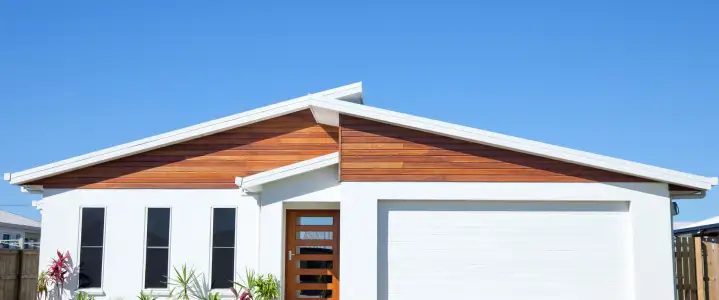What is a home equity loan?
A home equity loan is a way for homeowners to borrow cash for all kinds of big expenses that may come along in life. Let’s learn more about how they work.
How a home equity loan works
As you chip away at your mortgage, your debt decreases while your equity—the part of your home’s value you actually own—increases. A home equity loan lets you borrow against the equity that has accumulated in your property.
Say you've been dreaming of a custom-built kitchen or an in-ground pool. A home equity loan gives you a lump sum of cash which is paid back over a set period of time, much like your original mortgage.
Home equity loans generally have a fixed interest rate, so your monthly payments are steady for the life of the loan.
In short, a home equity loan is a mortgage product to consider if you're looking to consolidate debt or cover a major expense by leveraging the equity in your home.
Home equity loan requirements
Wondering how to get a home equity loan? Securing one involves a few key requirements. Fortunately, the process is straightforward once you know what's expected. Let's explore what you need to qualify for a home equity loan.
Home equity loan limits
First, let’s talk limits so you understand how lenders make decisions.
Home equity loans are based, in part, upon the equity in your home. Lenders will calculate your loan-to-value (LTV) to determine your eligibility and your loan amount. LTV is how much of your home you still owe money on. It's a measure lenders use to ensure they're not lending more money than the property is worth.


LTV in action
Let's break down how the loan-to-value ratio works with a simple example. Say your home is worth $1 million, and you owe $700,000 on your mortgage. Your LTV would be 70%.
Most lenders will let you borrow between 80 to 90% of your home's value. This way, you can use your home's equity to your advantage while keeping a safety net. This not only protects your financial health, but also safeguards the lender's investment.
Home equity loan interest rates
Home equity loan interest rates are similar to first mortgage's loan rates in that they are determined based upon the market and borrower risk.
Pro Tip
Per HGTV, the top three improvements that net the highest return on investment are a garage door replacement (193%), steel entry door replacement (188% cost recouped) and manufactured stone veneer (153%).
Home equity loan down payments
With home equity loans, there’s good news: no down payment is needed. This time around, you're borrowing against the value of what you already own, which makes accessing funds much easier. The funds from a home equity loan are also incredibly versatile. For example, you could use them as a down payment on a second home or even an investment property.
Home equity loan mortgage insurance
There's no need for mortgage insurance either, which is one less thing to worry about. With home equity loans, you're getting into straightforward borrowing.
If you're thinking about buying another home, you could use a mix of cash and a home equity loan to make up your 20% down payment. Hitting that 20% mark often means you can skip the mortgage insurance on the new home, which not only may save you money, but also simplifies your financial commitments. It’s a clever way to use the equity you’ve already built up in your home to grow your property holdings.
Home equity loan credit score
No surprise here: when it comes to securing a home equity loan, your credit score plays a pivotal role. A credit score of at least 620 is the starting point. It's a measure of your financial reliability, so the higher your score, the more favorable your interest rates can be.
To put it into perspective, even a slight bump in your credit score can mean big savings over the life of a loan. For instance, if improving your credit score leads to a 0.5% reduction in your interest rate on a $100,000 loan, that saves about $50 a month. Over a 15-year loan, that means $9,000 in total savings! Every point matters, so checking your credit report regularly should be at the top of your to-do list.
Home equity loan DTI
Lenders will typically want your debt-to-income ratio (DTI) to be 43% or lower. How did they arrive at this figure? The answer is that this number is a good sign that you're not spending more than you can afford.
If your DTI is higher than 43%, lenders might worry about repayment, which could increase the risk of loan default. On the other hand, a lower DTI is a green light for lenders as it shows your finances are under control and you can likely manage a bit more debt.
Home equity loan income requirements
Naturally, you'll need to be able demonstrate that you will be able to repay the home equity loan. Lenders need to see that you have sufficient income to make your loan payments along with other monthly expenses.
There's no magic salary cap you need to hit. Instead, it depends on the value of your home and how much you want to borrow. The bank will assess what your home is worth, what you still owe on your mortgage and the amount you'd like to borrow.
HELOC vs home equity loan
Both a home equity loan and a home equity line of credit (HELOC) let you borrow against your home's equity, but they serve different purposes and have different terms.
| Feature | Home Equity Loan | Home Equity Line of Credit (HELOC) |
|---|---|---|
| Disbursement | One lump sum | Draw money as needed up to a certain limit |
| Interest Rate Type | Fixed | Variable |
| Payment Consistency | Consistent payments for the life of loan | Payments vary, increase and decrease over time |
| Costs and Fees | May include points, closing costs and fees | Generally no points, potentially lower closing costs |
When to use a home equity loan
A HELOC might be best if you're not sure how much money you need or exactly when you'll need it. Maybe, instead of a dream kitchen, you're tackling a series of home improvements over the next few years. A HELOC is a revolving line of credit that acts much like a credit card, in that you only pay for what you have borrowed, but it is secured by your home.
It's great for projects with unpredictable costs or for covering emergency expenses as they arise. Unlike a home equity loan, a HELOC lets you draw and pay on a more flexible schedule and provides more leeway if you need more cash than expected.
Looking to explore your options?

